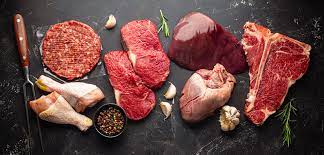Once considered a delicacy, meat has quickly become a staple in our diets, supported by a system that yields an astonishing amount of it. However, beneath the surface of this seemingly perfect system lie several inadequacies. Experts agree that consuming meat too frequently can be detrimental to your health, the environment, and animal welfare. In this quick read, I will explain how eating meat frequently can be damaging and suggest some alternatives to address protein deficiencies.
I. How eating meat can be detrimental to your health:
While eating meat once or twice a week can be healthy, the average American consumes meat a startling five times a week, more than twice the recommended dosage. Consuming animal-based proteins in such high quantities can harm your health by promoting the unhealthy proliferation of both normal cells and cancer cells.
Most meats cannot be eaten raw, necessitating cooking at high temperatures for extended periods. This process depletes much of the nutritional value and results in a higher concentration of trans fat and saturated fat, leading to elevated cholesterol levels and diseases such as cancer, diabetes, and heart disease.
Contrary to popular belief, white meat, such as chicken and turkey, is not always a healthier alternative to red meat. For example, 164 grams of chicken contains about 360 calories, and 164 grams of beef contains 407 calories, making their caloric values comparable. Additionally, frequent consumption of chicken has been linked to dense plaque buildup in the arteries.
II. How producing meat is harmful to the environment:
Meat production is not only harmful to health but also to the environment. Animal-based food production contributes to nearly half of the food system’s greenhouse gas emissions.
The production of meat releases greenhouse gases such as carbon dioxide, methane, and nitrous oxide, contributing to global warming by blocking heat from escaping and absorbing radiation. By reducing meat consumption, we can better protect ourselves from the adverse effects of global warming.
III. How obtaining meat is unethical to animals:
The process of obtaining meat involves slaughtering over 324 million cattle and killing over 70 billion land animals each year. Mass-producing animals for human consumption is not only ethically questionable but also unsustainable.
Animals are bred in captivity, often living in confined spaces and fed low-quality foods, leading to less nutritional value and sustainability. Alternatives to meat, such as vegetarian burgers and plant-based provisions, offer ethical and nutritious options.
As an advocate for good health, a better environment, and animal welfare, I contend that reducing meat consumption is the ultimate solution to these issues. Instead of solely relying on red meat, consider various alternatives like beans, yogurt, and nuts. You don’t need to eliminate meat entirely from your diet, but reducing your intake can contribute positively to your health and the well-being of the planet and animals.






